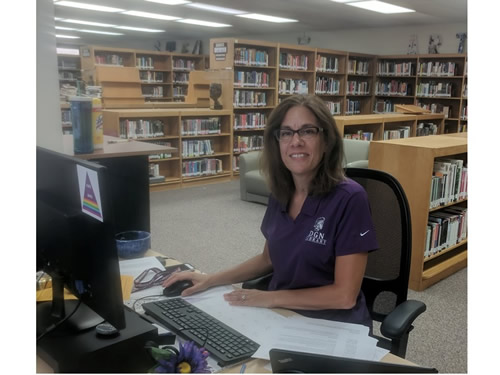Throughout my career, I’ve had the good fortune to work in various capacities as a librarian and with all levels of learners, from kindergarten through doctoral students. Presently, I’m a school librarian at North High School in Downers Grove, Ill., where I have the good fortune to be one of three full-time librarians in a school that serves 2,200 students. Additionally, I teach an online course called “Introduction to Libraries and the Information Age” at the College of DuPage in Glen Ellyn, Ill.
Whether or not technology is your favorite part of being a school librarian, there are simple ways to increase your value by connecting with teachers and offering assistance. Use your “librarian reference interview” skills to listen, ask questions, and offer suggestions.
Here are a few practical examples of how I help teachers integrate technology to positively impact student learning. Use them as examples or encouragement for growing your program.
1. Attend department meetings to inform and learn.
I begin each school year attending department meetings at which I make connections with teachers, learn about their department goals, and share the new and exciting things the library has to offer.
Making this connection led to a virtual reality lesson with freshmen and AP biology classes. Students used the library’s Android devices and VR viewers to experience the inside of plant cells from a playlist I curated; they had an immersive 3-D perspective unimaginable from a microscope slide or hard copy. Incidentally, I learned to never underestimate the value of being “seen.” Wheeling the devices down the hall sparked curiosity among teachers and students that resulted in additional opportunities.
2. Keep the tech simple.
Our school sets aside two hours each Monday for teachers to meet in professional learning communities (PLCs); often, the PLCs ask a librarian to attend. When I joined physical education teachers on to discuss assessment tools for a two-day lesson on eating lifestyles, I learned they wanted a straightforward research lesson involving simple technology.
I provided a LibGuide with curated source links and, to keep the final product simple, I made a Google Slide presentation to which each student would add a slide on their topic. I added two slides—directions and an exemplar—which were extremely helpful since I would not be in the classroom.
We librarians get excited about research and technology, but we need to remember a full inquiry project using cutting-edge technology is not always wanted or needed. Providing a virtual lesson and including my email gave me a presence without being present.
3. Refresh past lessons.
Setting aside time to plan with teachers has many benefits, including the chance to update instruction and tech tools. When I refreshed a science lesson on genetics, I changed the final product from a newsletter to a website. The simplicity of Google Sites allows students more time for preparing content. We set aside four days for the lesson and I was in the classroom each of those days.
I prepared and shared a Google Doc formatted as a research organizer in which students linked their sources and wrote their content. They used NoodleTools to generate citations. Having access to their docs, I checked sources for credibility and citations for proper formatting and made comments or met with individuals. As I checked sources and citations, the classroom teacher checked for clarity and content. Results were better than previous years and a clear indicator that as technology products become easier to use, our focus moves from tech instruction to content and creation.
4. Engage students by allowing them to be experts.
I like to begin technology lessons by asking students to raise their hands if they’ve used the tool before and then asking, “Who thinks they are an ‘expert’ or someone who can answer questions? When I did this in a sophomore health class that was designing digital stories, the teacher followed up with, “Look around; these are the go-to people.”
Students love to share what they know and in collaborative environments it’s easy to do. Bring up the student’s page on the projector and walk the class through the skill to be shared. Librarians are technology leaders but do not need to be the final expert. Enjoy learning alongside students.
5. Be willing to go above and beyond.
Freshmen at my school attend after-school tutoring sessions in the library. At the end of a long day of Google Sites instruction, I was picking up my coat to leave when a student stopped by my desk and asked for help. After answering his question, I noticed several of the students I had worked with that day. My coat went back on the hook and I spent the next 30 minutes circulating around the library to check citations, read content, and troubleshoot the technology. This small investment of time was appreciated by the teacher and students who may have fallen behind but were now on track to finish with the others.
Additional takeaways
Technology is just one component, but a significant one, of a strong school library program. Don’t neglect it or let it become your only focus; instead, use it as a catalyst for moving your program to the next level.
Stay visible, listen to teachers, and ask questions to clarify needs. Offer ideas for practical applications to create learning environments that support and challenge students. Strive to be a facilitator and let students take the lead when possible. And perhaps most important, remember the library does not need to be a physical space—it’s a state of mind.

You need to be a member of School Leadership 2.0 to add comments!
Join School Leadership 2.0